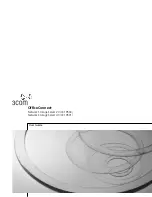
48
Product Manual - Disc Drive SCSI-2/SCSI-3 Interface (Vol. 2; Ver. 2), Rev. E
_____________________________________________________________________________________
Command Terminated - This status shall be returned whenever the target terminates the current I/O pro-
cess after receiving a TERMINATE I/O PROCESS message (see 3.5.2). This status also indicates that a
contingent allegiance condition has occurred (see 3.2.3). This message is not supported on standard OEM
drives, but is a factory installed option.
Queue Full - This status shall be implemented if tagged queuing is implemented. This status is returned
when a command is received and the command can not be accepted because the command queue is full.
The command is not executed.
4.4
Command examples
4.4.1
Single command example
A typical operation on the SCSI bus is likely to include a single Read command to a peripheral device such as
the disc drive. This operation is described in detail starting with a request from the initiator. This example
assumes that no linked commands and no malfunctions or errors occur and is illustrated in Figure 4.4-1.
The initiator has active pointers and a set of stored pointers representing active disconnected SCSI devices
(an initiator without disconnect capability does not require stored pointers). The initiator sets up the active
pointers for the operation requested, arbitrates for the SCSI bus, and selects the disc drive. Once this pro-
cess is completed, the disc drive assumes control of the operation.
The disc drive obtains the command from the initiator (in this case, a Read command). The disc drive inter-
prets the command and executes it. For this command, the disc drive reads the requested data from the Disc
Media and sends this data to the initiator. After sending the read data to the initiator, the disc drive sends a
status byte to the initiator. To end the operation, the disc drive sends a Command Complete message to the
initiator and then goes to the Bus Free state.
















































